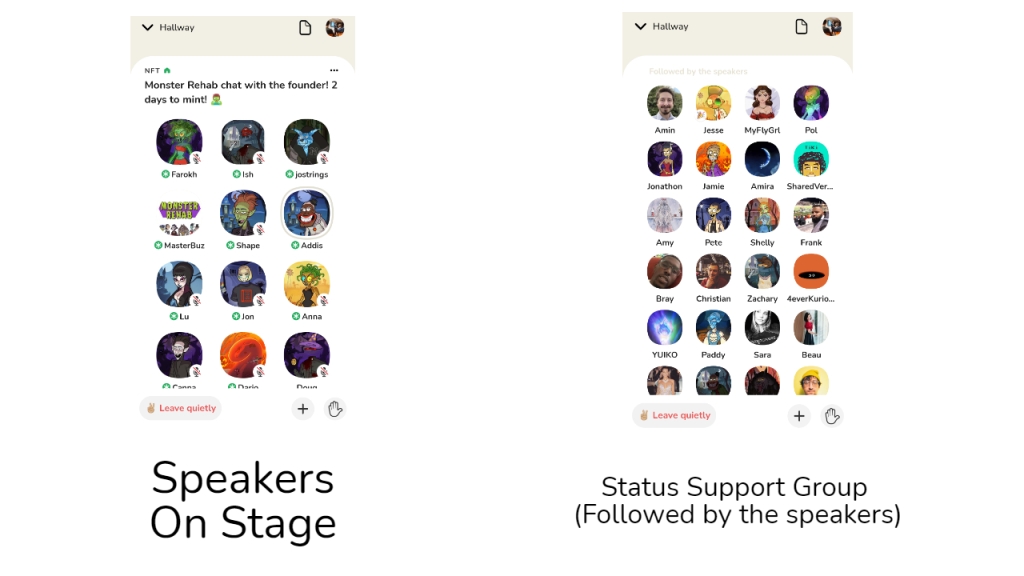Nothing anyone says on Clubhouse matters. The whole point of Clubhouse is to be seen. It doesn’t matter who speaks or what they say. It matters that they are seen as high status people.
Clubhouse rose to prominence when no one could be seen in person. Everyone was stuck in their homes. Someone with a high reputation, credibility, or value to a group couldn’t flex their status in person. They couldn’t brag in person about the work they were doing, signal how smart they were, or tell you about their role at some cool company. Clubhouse was a way to be seen with other high status people, especially in circles like tech and crypto.
Now that high status people can be seen in person again, they are spending less time on Clubhouse. Lower status people are left trying to be seen amongst themselves. Without high status people, Clubhouse is not serving its purpose of helping people be seen. It is a cargo cult: low status people recreating the actions of high status people, after they have left, thinking it will cause them to be high status.
The Relics Left Behind
The relics of the status games are in the design. Even before you enter a room, Clubhouse shows you the people you follow in it. A user can judge the status of a room based on its size, the status of the speakers, and the status of any people they follow. High status people are often the most followed so they guide the discovery. Without these people, discovery is gamed and less relevant.
Each room has status games being played within it as well. If you look at other live social apps, audiences generally do something like chat or react. On Clubhouse, anyone not talking has nothing to do except listen and look at other members of the room. When you look at the screen, you’ll see every room is a hierarchy. The important people on top, their support in the middle, and the audience on the bottom.
The important people are on stage. It is the highest form of being seen. In big rooms, if you are on stage, everyone’s attention is on you, even if you aren’t speaking. These people literally are at the top and take up the most space, having the largest avatars only three to a row. Their status increases by being there with high status people. This is the ultimate goal of a status-seeking Clubhouse user.
The next level of the hierarchy is the status support group. It is a designated zone for the group of people who the speakers follow. If high status people are here, it means the people on stage must be very high status. They provide extra credibility for those on stage and help the room get discovered by more people.
For example, a startup founder is speaking in a room and a prominent venture capitalist is in the audience. If that VC knows the company, there isn’t any new information going to be shared, but there is status to doing it. It is beneficial to the status of both the speaker (founder) and the status support member (VC) to be there. The venture capitalist’s authority rubs off on the speakers, making them seem more legitimate.

The lowest in the hierarchy is the audience. These people are so far down the hierarchy they are rarely ever seen in large rooms. Anyone who wants to be seen and gain status should try to leave this area. People are here because they are truly interested in the conversation or are trying to move up the hierarchy so they can gain status. Low status audience members rarely get a chance to engage in big rooms. They are status fodder for people up the hierarchy.
Fighting to Be the Place to Be Seen
Now that the high status people are mostly gone, lower status people fill all levels and try to recreate the dynamics. The design of Clubhouse is still the same. People try to be seen on stage in popular rooms. Organizers try to optimize their room to be recommended. Users fill their bio with interests and topics they care about. All of this is diluted because the people with status aren’t there anymore. The status and recognition people want is not there.
There are fewer “must-listen” rooms with massive audiences. Rooms are smaller and driven by interests or topics, rather than the people involved. The recommendation algorithm, which is driven by people you follow, is less relevant. Following lists are increasingly filled with low status people who are active on Clubhouse rather than high status people from the real world. The exclusivity from launching as invite and iPhone only is wearing off now that anyone can join including Android users. Clubhouse is not the high status place to be seen anymore.
A way to illustrate this is the decline in fear of missing out on Clubhouse. Few people think they are missing anything by not being there. Compared to its peak when people were buying invites, sending them to their closest friends, spending hours on the platform, and talking about it on social media, Clubhouse doesn’t have the same magic it once did.
High status people can now be seen together in exclusive places in real life. In person parties and events are impossible to compete with. It also doesn’t help that Clubhouse is being copied by seemingly every other big tech company. Everyone wants to recreate the magic Clubhouse had.
Can Clubhouse ever recreate the magic of being a high status place to be seen? They can try. For every category of people, not only in tech and crypto, they must become “the place” to be seen with other high status people. High status people must want to flex their status and share it with others on the platform. If this happened, the low status cargo cult members would gain the status boost they’re looking for.
The other option is to embrace the lower status people. Many interesting rooms and behaviours are happening outside the big ones. Recent releases like messaging give hints they are moving away from only being a “place to be seen.” The app has the potential to be the mass audio social network. This was likely the plan all along, and they had a lucky break with the “place to be seen” diversion.
Either way, people always want to be seen. Clubhouse, for a moment, captured that need. To succeed as once thought, they need to do it again at a larger scale or embrace the behaviours of lower status people. If not, the cargo cult of Clubhouse will continue.
Thanks to Jesse Germinario, Steven Ovadia, Padmini Pyapali, Diana Klatt, Kat Dee, Stacey King Gordon, and Christine Cauthen from Foster for the feedback.
Let me know what you think on Twitter.

The less-populated and more niche rooms are much better in my experience.
Whenever I go onto Clubhouse I always spend some time slowly scrolling down and carefully searching for rooms with interesting titles and fewer members.
I’ve had some great chats in those rooms, including topics such as self-motivation, career tips for software developers and business relationships.
Yeah, I do believe good rooms and experiences can happen, but I don’t think the app is designed in such a way to encourage the exploration of smaller and more niche rooms. Hope it moves that way in the future (and it does seem like it).